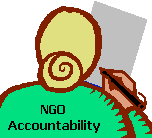Exploring the 'Accountability' Challenge
 Traditionally adopting the role of holding other decision-makers to account, non-governmental and non-profit organisations (NGOs/NPOs) have themselves come under increasing scrutiny over recent years. Issues surrounding the accountability of NGOs and the legitimacy of their claim to act as the voices of civil society were first debated in academic and research circles (for example by Michael Edwards from the Ford Foundation) before being taken up by the NGO community itself. The last few years have seen the proliferation of a broad range of initiatives, seeking to promote the accountability of the third sector. Apart from governmental regulatory moves, most of these NGO accountability initiatives tend to originate from within the sector and provide good examples of varying forms and degrees of self-regulation (for an overview see Robert Lloyd (2005) The Role of NGO Self-Regulation in Increasing Stakeholder Accountability, One World Trust). [One World Trust]
Traditionally adopting the role of holding other decision-makers to account, non-governmental and non-profit organisations (NGOs/NPOs) have themselves come under increasing scrutiny over recent years. Issues surrounding the accountability of NGOs and the legitimacy of their claim to act as the voices of civil society were first debated in academic and research circles (for example by Michael Edwards from the Ford Foundation) before being taken up by the NGO community itself. The last few years have seen the proliferation of a broad range of initiatives, seeking to promote the accountability of the third sector. Apart from governmental regulatory moves, most of these NGO accountability initiatives tend to originate from within the sector and provide good examples of varying forms and degrees of self-regulation (for an overview see Robert Lloyd (2005) The Role of NGO Self-Regulation in Increasing Stakeholder Accountability, One World Trust). [One World Trust]In the paper "Mechanisms for NGO Accountability", the author Lisa Jordan discusses the costs and benefits of ensuring NGO accountability, particularly with regards to the current practice that emphasizes 'upward' and 'external' accountability to donors. [Read Global Public Policy Institute Document]
Simon Zadek, chief executive of AccountAbility, explored a new generation of accountability mechanisms focussed on the horizontal and not the hierarchical in "Reinventing Accountability for th e 21st Century". [On Open Democracy]
e 21st Century". [On Open Democracy]
Kumi Naidoo, Secretary General and CEO of CIVICUS, posed the civil society accountability issue as a question on “Who Guards the Guardians?” [CIVICUS]
The Global Development Research Center's site compiles a range of reading material on legitimacy and transperancy. [GDRC]

0 Comments: